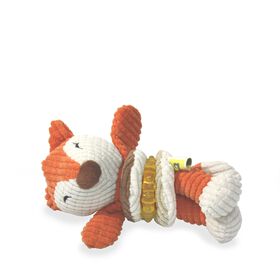Did you know that it is important to socialize your puppy in the first months following its adoption by exposing it to various stimuli, doing desensitization exercises and ensuring contact with other puppies and humans? 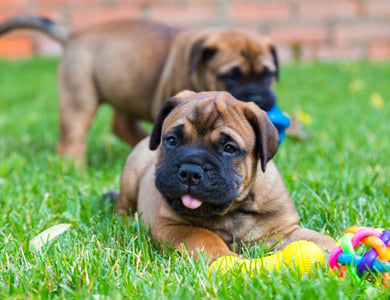
Where does socialization begin?
Socialization begins long before your pet is born. In fact, breeders play a key role in your future relationship with your pet.
It is not true that the entire socialization process takes place between weeks 8 and 16, and that you alone are responsible for its success or failure.
There’s no doubt that this is a crucial period and that you should expose your new puppy to different scenarios during that time. However, some predominant factors affect your puppy’s psychological well-being and social development before you even enter the picture:
- Genetics
- Rearing by the mother
- Training from the person overseeing the litter
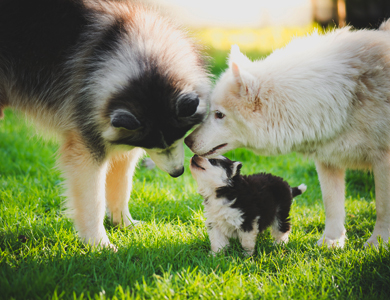
Genetics
To optimize an animal’s ability to adapt, as well as its receptiveness and desire to interact with humans, it is necessary to have a mother that exhibits these characteristics and can then transfer them to her offspring. For example, the puppies of a dog that is shy and reluctant to interact with humans will, through imitation, learn to be distrustful.
The following completely different example illustrates the role of genetics: two genitors with a history of shyness could greatly increase the chances of producing puppies with a shy and nervous temperament. Consequently, choosing stable, healthy and sociable parents increases the chances of producing offspring that are more receptive to socialization.
Rearing by the mother
The way the mother rears her pups will impact their behaviour and their ability to manage stress and, consequently, how they adapt to new situations. It is therefore essential that weaning occur naturally and that the pups not be separated from their mother too soon or abruptly.
When is a good time to begin weaning? When ALL of the following conditions are met:
- The pups are at least seven weeks old and in good health.
- The pups are able to eat dry kibble, and can eat and drink on their own.
- The mother shows signs of impatience during or after nursing.
- The mother increasingly needs time away from her pups.
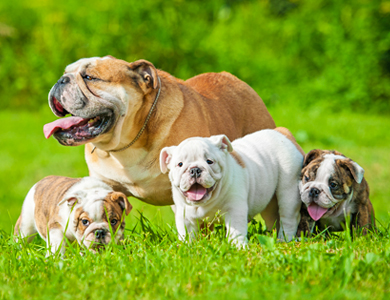
What breeders should do in the first few weeks
Weaning should be done gradually, over a period of one to three weeks. For rearing purposes, the pups should remain with their mother until they leave for their new family. They must be at least eight weeks old before they are taken from their mother.
For the sake of the mother’s psychological well-being, it would also be unwise to take her entire litter away from her. It is essential that dog breeders have an in-depth knowledge of canine behaviour, since they play a decisive role in the pups’ future, i.e. selecting and providing:
- Breeders who are both physically and mentally healthy, with good social skills and no behavioural issues.
- An environment that fosters mental development and stimulates the growth of pups as well as their mother, thereby limiting stress.
- Daily interactions, including handling and desensitization of the pups by humans.
- Natural weaning after seven weeks, limiting stress and any predisposition to anxiety disorders or other behavioural problems.
- Information from a skilled behaviour specialist to ensure that the pups are properly socialized.
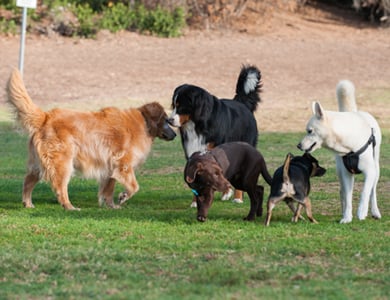
What to do when you adopt a dog
In order to properly socialize your new puppy between the ages of two and a half and six months, be sure to do the following:
- Gradually expose your puppy to new situations to strengthen your relationship of trust and help it learn how to manage stress.
- Expose your puppy to men, women and children, and encourage regular interactions with them.
- Ensure frequent contact with other puppies and well-trained adult dogs, so that your pet learns the language and continues to socialize with its peers. Go to the dog park, for example.
- Provide positive desensitization to being handled and teach your puppy to stay quiet, which it will have to do throughout its life (e.g., during veterinary exams, grooming, interactions with children). Teaching him the basic commands can also help him.
- Teach your puppy good manners and set clear limits so that the concept of respect, acquired from its mother, carries over into the puppy’s new environment. This will reassure the puppy and help establish a strong sense of trust between you.
Remember that older dogs that were deprived as pups can also benefit from socialization training.
Establish a relationship of trust with your dog, and it will never leave your side.


